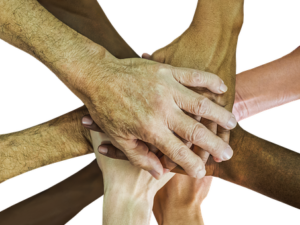It was October 1986. Hitchhiking across the country, Sebastian Junger stood outside of Gillette Wyoming, carrying a week’s worth of food in his backpack. A man in soiled coveralls walked up the on-ramp toward him. The man’s hair looked shabby, but he didn’t seem aggressive. Still, Sebastian was young and alone and “watched him like a hawk.”
Here’s how he remembers the encounter in his book, Tribes:
The man studied him and asked where he was headed.
“California.”
He nodded. “How much food do you got?”
Sebastian was obliged to share his food, but he didn’t want to be robbed.
“Oh, I just got a little cheese.”
 He shook his head. “You need more than that.”
He shook his head. “You need more than that.”
Turns out the man lived in a broken-down car. Every day he walked three miles to a coalmine to see if they needed extra hands. Some days they didn’t and that day was one of them.
“I won’t be needing this,” he said opening his lunchbox, which contained a bologna sandwich, an apple, and a bag of chips—probably provided by a church. “I saw you from town and just wanted to make sure you were okay.” The guy turned and headed back toward Gillette.
Sebastian thought about that man for the rest of his trip. In fact, he thought about him for the rest of his life.
 It was more than generosity. In some way, that kind man took responsibility for him. “For reasons I’ll never know,” he wrote, “the man in Gillette decided to treat me like a member of his tribe.”
It was more than generosity. In some way, that kind man took responsibility for him. “For reasons I’ll never know,” he wrote, “the man in Gillette decided to treat me like a member of his tribe.”
 In Tribe, Sebastian Junger ponders “why that sentiment is such a rare and precious thing in modern society, and how the lack of it has affected us all.” Our contemporary world has stripped away peoples’ sense of community. Oddly enough, to many “war feels better than peace…and disasters are sometimes remembered more fondly than weddings or tropical vacations.” Why? Because we feel more authentically connected to others in hard times.
In Tribe, Sebastian Junger ponders “why that sentiment is such a rare and precious thing in modern society, and how the lack of it has affected us all.” Our contemporary world has stripped away peoples’ sense of community. Oddly enough, to many “war feels better than peace…and disasters are sometimes remembered more fondly than weddings or tropical vacations.” Why? Because we feel more authentically connected to others in hard times.
 What has our prevailing culture done to us? For all our medical, scientific, technological, and educational advances, Junger says it might all come down to this—with whom would you share your last bit of food?
What has our prevailing culture done to us? For all our medical, scientific, technological, and educational advances, Junger says it might all come down to this—with whom would you share your last bit of food?
Consider the meaning of “tribe” beyond racial terms or bloodline connections. Think of it as the people in your realm that you do life with. The circle of friends and family who have your back, who share their resources, who need what you can contribute, as you need them. The ones who challenge you to be an authentic person by being genuine themselves. The people who show up when everything’s in pieces.
 We must intentionally pursue our “tribe,” because everything in our modern world undermines the experience of community we desperately need.
We must intentionally pursue our “tribe,” because everything in our modern world undermines the experience of community we desperately need.
Our sophisticated civilization is full of people without purpose, often living duplicitous lives, communicating largely through devices, with the goal of earning enough money so they “don’t need nothing from nobody.” Our culture is toxic to our design.
We were created to be tribal.
Finding your tribe is the essence of the Kingdom of God. Some reference the organic unity of a physical body—the body of Christ. Yet this perfect metaphor can be a far cry from organized church structures. Too often, we end up as spectators at church. We stay at the level of “greeting” others.
 Few get down to the small group context where I believe church really happens. It comes down to a dozen people who pour their lives into each other. But it has to be more than individual relationships. A tribe involves a group dynamic.
Few get down to the small group context where I believe church really happens. It comes down to a dozen people who pour their lives into each other. But it has to be more than individual relationships. A tribe involves a group dynamic.
I have been part of several small groups. Some were couple’s groups. Another, for just women, has lasted for nearly 20 years. A tribe doesn’t entail a lot of relationships. On the average, there have been 10 of us over the years.
Our women’s group established some boundaries to encourage the safety and intimacy we hoped to develop. For instance…
—Respect and honor– No bashing of husbands or other family members. No dissing another’s church denomination.
 —Confidentiality of everything shared.
—Confidentiality of everything shared.
—Even sharing – no one dominates the group discussion. Talkative ones encourage quieter ones to participate.
—No solicitation for business or marketing purposes.
—No politics! Especially important in an election year.
—Personal prayer requests – for self and family only. To ask for prayer for your uncle’s wife’s boss’s nephew is a copout. Authenticity means getting real about what’s going on in your life.
—Avoid “giving advice”– better approach is to share your experience and hope on a topic that comes up in the group.
—Repentance and grace– if there’s an offense, apologies are quick and forgiveness is genuine.
—Empathy– no judgment of another’s circumstances or past.
 In my “tribal” experience, we pass an offering basket when someone has financial needs. We cook dinners for each other when someone is ill, injured, or grieving. We share garden produce and buy each other’s handiwork. There’s no whiff of judgment if one has a son in trouble with the law, or an unmarried daughter with a baby, or an alcoholic spouse. We’ve learned to listen and encourage honesty, authenticity, and confidentiality. And interestingly, we do not all attend the same denomination.
In my “tribal” experience, we pass an offering basket when someone has financial needs. We cook dinners for each other when someone is ill, injured, or grieving. We share garden produce and buy each other’s handiwork. There’s no whiff of judgment if one has a son in trouble with the law, or an unmarried daughter with a baby, or an alcoholic spouse. We’ve learned to listen and encourage honesty, authenticity, and confidentiality. And interestingly, we do not all attend the same denomination.
Still, we are a tribe.
 And many tribes together, built on the same foundation of Jesus Christ, can cultivate kingdom culture, transcending generations, nationalities, and races, and serve as a light in this critical time of human history.
And many tribes together, built on the same foundation of Jesus Christ, can cultivate kingdom culture, transcending generations, nationalities, and races, and serve as a light in this critical time of human history.
A word for the times… Last week, a 14-year-old boy named Karthik Nemmani won this year’s Scripps National Spelling Bee by spelling the word “koinonia” correctly. The word means, “Christian fellowship or communion with fellow Christians.”
Have you found your tribe?








This makes me long for such a community. I’m an extrovert, who has become introverted. The speaker, the face in my fellowship, who feels genuine compassion, but little kinship with my group of fifteen years. I’ve only recently been questioning this arrangement., wondering if it’s selfish to expect more.
Thank you for exposing something greater, and for making your heart a warm place to visit.
Thanks for your comment Leah. I hope you cultivate a tribe that is satisfying and rich!